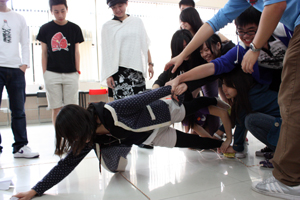
After two weekends of training, the English Ambassadors are ready to share their secrets of how teamwork can help you to survive death defying activities like this. The training sessions were great fun even though it was on the weekend. The camp during Easter should be just as good! (Even better)
Monthly Archives: March 2010
Crossroads
The visit to Crossroads today was great. Often, we talk about things without really understanding them. At the start of the day, DJ asked us what we thought about people who were poor – and what poverty was. The activities really showed some realities of poverty – and how hard it is to escape from that that cycle. Best of all, he left us thinking about what we can do to help the billions of others in the world who struggle to survive each day.
BBC learning English
This is a reminder to all of you especially in Form 6 and 7. There is a link on the right to the BBC learning English – 6 minute English page. This is a place you can visit when you have a few minutes to spare. One topic you might like to visit is the one about plastic pollution. Remember, you can listen to the audio and download a PDF of the discussion to check the vocabulary.
English speaking Day
Two of the highlights of the assembly this week were the drama performances from 6A and 6S. The annoying oranges from the 6A performance could still be seen in the window of their room for days after the performance. In many ways, the work that went into developing these performances highlights other ways we can learn English. Having a real audience and purpose makes the use of language more meaningful.
In the latest edition of English Street, Victor Chung, who was the first local Chinese to become deputy editor of the SCMP, reminds us that when we are learning a language, we need to enjoy what we are learning. Find something you enjoy to help you learn English – comics, music, drama … or even just plain hard work.
TYPHOON
Amazingly good. See the details from Brenda on the teaching page. I created two sets of cards – one with questions and the other with the “points” including Typhoon cards. The distribution is shuffled and random. The points card is drawn after the team has answered correctly. It’s great fun – especially when the team in front loses all their points to the typhoon. Slightly different rules to the ones I used can be found on the GenkiEnglish site. I think I’ll change the rules each time just to keep them on their toes!.
Hey Form 7 …….
Check out the Form 7 pages for notes from the last class. These are on the Form 7 page. And all the best for your exams!


